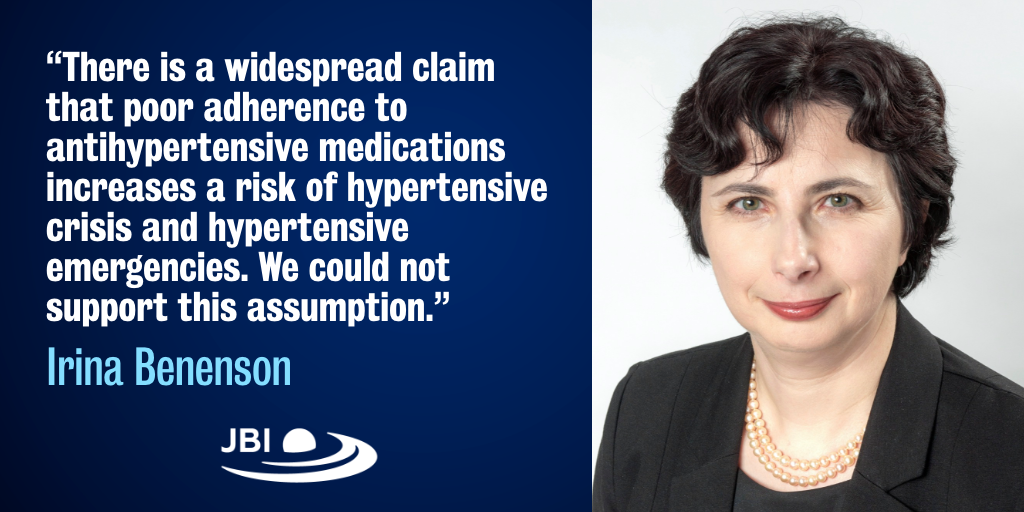
Risk factors for hypertensive crisis
What does – and does not – increase the risk of hypertensive crisis in adults diagnosed with hypertension?
A new systematic review recently published in JBI Evidence Synthesis , ‘Risk factors for hypertensive crisis in adult patients,' finds that coronary artery disease, congestive heart failure, cerebrovascular disease, and chronic kidney disease increase the risk of hypertensive crisis. However, the risk of hypertensive crisis was not increased in patients with poor adherence to antihypertensive medication.
Lead author Dr Irina Benenson is Assistant Professor at Rutgers School of Nursing in Newark, NJ, USA. Dr Benenson explains the importance of the systematic review:
Hypertensive crisis is an acute and severe elevation in blood pressure. The condition is called hypertensive emergency when the spike in blood pressure is accompanied by life-threatening complications such as stroke, myocardial infarction, pulmonary edema, and acute kidney injury. In addition to poor clinical outcomes, hospital admissions rates for patients with hypertensive crisis is strikingly high, contributing to an economic burden on the system. Thus, understanding risk factors of hypertensive crisis is a key step in improving care of patients with severe hypertension while reducing healthcare utilization.
‘This systematic review is important because the information it provides can be used to risk-stratify patients and help in clinical decision making to identify patients who are at high risk for acute complications.’
Nineteen studies from 13 countries were included in the review, with a total of nearly 12,000 participants, both men and women, aged 18 years and older. Results of the systematic review show that risk factors for hypertensive crisis include unhealthy consumption of alcohol, recreational drug use, and history of chronic kidney disease, coronary artery disease, congestive heart failure, and stroke. Risk factors for hypertensive emergencies include chronic kidney disease, previous stroke, male sex , older age, history of diabetes, and hyperlipidemia.
Dr Benenson elaborates:
In this review we found that coexistence of diabetes, hyperlipidemia, chronic kidney disease, and previous stokes increased the risk of hypertensive emergencies. Metabolic abnormalities (high level of glucose, insulin, lipids, and other inflammatory substances) that are common in these conditions initiate and sustain inflammation and lead to water retention and arterial constriction that eventually result in severe elevation in blood pressure. Hypertensive emergencies were more common in older adults and male patients. Unhealthy alcohol consumption that is known to be associated with chronic hypertension was not a risk factor for hypertensive emergencies.
Results also show that non-adherence to hypertensive medication is not a risk factor for hypertensive crisis or hypertensive emergencies:
There is a widespread claim that poor adherence to antihypertensive medications increases the risk of hypertensive crisis and hypertensive emergencies. We could not support this assumption. The risk of hypertensive crisis was not different in patients with good and less-than-satisfactory adherence to antihypertensives. This can be explained, at least partially, by the fact that most included studies used patient self-report to assess adherence to medications, which is known to have suboptimal accuracy and usually overestimate adherence to prescribed therapies. Future studies that will use objective measures (plasma or urine drug levels) can give better insights on this issue.

The systematic review highlighted that findings from previous studies relating to the risk factors of sex and comorbid vascular conditions, and the exact mechanism by which hypertensive crisis and hypertensive emergencies develop, are unclear. In particular, Dr Benenson draws attention to the need for further research into ‘non-traditional’ risk factors:
The review was focused on traditional risk factors (age, sex, comorbidities). However, several contemporary studies established an association between cardiovascular disease and some non-traditional risk factors (plasma fibrinogen, homocysteine, leptin, and coronary artery calcification score). Further research is needed to explore the role of these factors in the development of hypertensive crisis. Knowledge on these novel indicators may help to improve patient risk stratification and establish targeted interventions to reduce the risk of hypertensive crisis and hypertensive emergencies.
Finally, Dr Benenson summarises the key takeaways from the systematic review for clinicians:
The risk of hypertensive emergencies is higher in older adults, thus, blood pressure control to reduce devastating organ injuries is even more important in older adults than in younger patients. Given this risk, clinicians should not hesitate to treat hypertension in older individuals.
In the presence of comorbid conditions (diabetes, dyslipidemia, chronic kidney disease), sustained severely elevated blood pressure may lead to further damage to vital organs and hypertensive emergencies. Although the importance of controlling blood pressure levels cannot be discounted,
prevention and intensive treatment of diabetes, dyslipidemia, and kidney disease are essential to reducing the risk of acute complications of severe hypertension.
References
Benenson I, Waldron FA, Jadotte YT, Dreker M, Holly C. Risk factors for hypertensive crisis in adult patients: a systematic review. JBI Evid Synth. 2021;19(6):1292-1327.